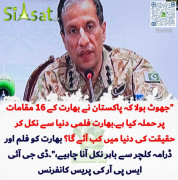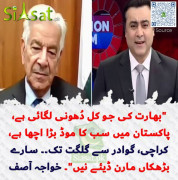sagaciouscorpion
MPA (400+ posts)
See how they are still creating doubts about the operation Rah e Rast....
Fight Flub
Pakistan's all-out offensive against the Taliban may already have failed.
Ron Moreau and Sami Yousafzai
Newsweek Web Exclusive
When Shamshir and his family of nine left the Shah Mansoor camp for internally displaced persons (IDP) early one morning this week, traveling aboard a government-hired bus along with 10 other families, they thought they'd be in their native village of Gorkand in Buner district by nightfall. But by late afternoon, they sat looking lost and forlorn at a dusty intersection called Daggar Chowk, where they and their modest possessions had been unceremoniously dumped, some 20 kilometers short of their destination.
The bus driver and their government escorts had deemed too dangerous the final leg of the journey to their village. Abdul Rashid, a 22-year-old local farmer lounging on a rope bed in front of a shuttered shop informed Shamshir that the Pakistani Army had not finished operations near his village. The Army is supposedly winding down a three-month offensive in the Swat Valley to root out the Taliban and other insurgents. But the more than 2 million civilians who had fled or been asked to leave during the battle are wary of returning home from the IDP camps. They know how hardy the guerrillas are, and they doubt the fight is over.
Only a few weeks after their resounding declarations that the insurgents' "backs had been broken," the Army and the paramilitary Frontier Corps are still hotly engaged in actions that seem to be much more serious than mere "mopping up" operations. In a mid-June briefing to journalists in Buner, Pakistani Army Col. Nasir Janjua said that the militants' resistance had collapsed with the deaths of some 490 insurgents, and that "the area is fully secured." The military has made similar claims about Swat, the center of the Islamist insurgency demanding the imposition of Sharia; the movement there was led by Maulana Fazlullah, a radical cleric who spread his extremist message via illegal FM radio broadcasts and brutal terrorist tactics ranging from assassinations and beheadings to the demolition of girls' schools.
But the battle obviously isn't yet won. Even now, barely a day goes by without Army spokesmen announcing the deaths of dozens of militants in the continued fighting in Swat and Buner. For a defeated force, the insurgents seem to have incredible staying power. And their leadership seems to be largely intact, despite claims that insurgent commanders have been killed and Fazlullah has been wounded. Having failed to produce evidence backing up these statements, many IDPs remain leery about security in their hometowns.
They have good reason for doubt. This was the third military offensive against Fazlullah's rebellion since November 2007. In the previous two, the militants were driven out of the Swat Valley and into the mountains, where they holed up until a ceasefire was called. Then they came storming back. This time, the Army vows to fight until, in the words of Pakistani President Asif Ali Zardari, it has achieved "the complete elimination of militants." Few Pakistanis believe that will ever happen.
Civilians displaced from Buner and Swat by the government offensive told NEWSWEEK they quietly dread what they will find when they get home. Still, Islamabad kicked off its repatriation effort this week, with some 31,000 IDPs headed home from three months of living in camps, the houses of friends and relatives, and even the homes of welcoming strangers. The government says it plans to resettle them within 40 days, but it's historically bad at managing massive projects that require expert planning, coordination, and execution among various agencies and the military.
Jahanzeb, who has been in the Yar Hussain IDP camp near Swabi for more than two months, has agreed to return in the next few days to Matta village in Swat, even though he is frightened. Matta was Fazlullah's main base, and Jahanzeb is concerned that "the Radio Mullah," as he calls him, will return. "I badly want to go home," says the 35-year-old driver who wears a thin, well-trimmed beard. "But I also know that Fazlullah and his Taliban are still in the hills. As long as he is still there I'm afraid our problems will never cease." He also complains that he still hasn't received the $300 the government promised to all IDP families for their ride home.
Sherzada, 50, a day laborer from Khoza Khel village in Swat, not only doubts the government's promises, he also blames the Army for the death of his mother, who, he says, was killed in a helicopter attack that destroyed their house in May. (A number of IDPs claimed that the military offensive caused more death and destruction than the Taliban ever did.) He is bursting with questions that no one has answered. "How will I rebuild my house? How will I eat? Where will I find a job? What if the Taliban come back?" he asks two NEWSWEEK reporters at the Yar Hussain camp, which houses some 31,000 IDPs.
A few IDPs even complain that they are being "forced" to go back prematurely by deteriorating camp conditions. Rashid Khan claims he and his family in the Yar Hussain camp have not received fresh water this week, and that he is constantly beaten by the police and camp officials during the daily scrum as refugees fight for food rations. "We are being forced back by this camp's bad conditions," says Khan, who came from Mingora, Swat's capital. "If officials can't run this camp property, what kind of help can we expect when we return home?" he asks.
To be sure, none of this means that Pakistan's attack on the militants in Buner and Swat has failed outright. This was the biggest and most successful offensive ever: it drove militants deep into the hills and killed scores, perhaps hundreds, of them. But that hardly means Pakistan has crippled their highly motivated leadership or frightened them into permanent hiding. Even if the Army keeps its pledge to stick around for a while, it runs the risk of appearing as an occupying force in this region unused to centralized control. It is also unclear if the government could deliver better governance, and access to justice, relief, rehabilitation, and economic opportunitythe main agents in turning popular support away from the militants.
Ali Yousaf, for his part, is nervous but happy. The 27-year-old returned to Daggar, Buner's capital, last week and reopened his textile shop along the one-street commercial section where fruit and vegetable markets and other shops were already open. "We are hopeful, but still quite frightened," he said as busloads of IDPs roared passed his shop, where he used to sell music cassettes and CDs until the Taliban blew it up one night in 2007.
A few kilometers up the road, Bakhtiyar Khan wondered if it was a good idea to come home as he stood with his family on a country road just north of Daggar Chowk. A relative had just brought both good and bad news: the family's house is still intact, but at night armed groups of up to 30 men still roam in his forest village, and several houses have been looted. "If there's peace, I can rebuild my life," said Khan. "But hearing this, I'm not so sure." Then a car screeched to a top. Four men got out and told refugees not to travel any farther north. "There are still Taliban sympathizers in the villages nearby," one said. He then warned that three political workers for the secular Awami National Party were abducted and beheaded three days earlier by militants near Pir Baba, less than 10 kilometers farther on.
Back at Daggar Chowk, Shamshir and his family of nine conferred with Rashid, still lying on the rope bed, as a dozen pickup trucks carrying Pakistani troops with their automatic weapons at the ready raced by. Suddenly, a loud explosion rang out, followed by the whistling of an artillery shell fired from a cannon nearby and bound for the area near Shamshir's house. "The government told us we could return to our village in safety," said the 50-year-old, white-bearded farmer. Glancing at his wife and children sitting on their bundles at the dusty roadside, he wondered, "Now we are without a home once again Where can we spend the night? When can we return to our village?"
URL: http://www.newsweek.com/id/207032
Fight Flub
Pakistan's all-out offensive against the Taliban may already have failed.
Ron Moreau and Sami Yousafzai
Newsweek Web Exclusive
When Shamshir and his family of nine left the Shah Mansoor camp for internally displaced persons (IDP) early one morning this week, traveling aboard a government-hired bus along with 10 other families, they thought they'd be in their native village of Gorkand in Buner district by nightfall. But by late afternoon, they sat looking lost and forlorn at a dusty intersection called Daggar Chowk, where they and their modest possessions had been unceremoniously dumped, some 20 kilometers short of their destination.
The bus driver and their government escorts had deemed too dangerous the final leg of the journey to their village. Abdul Rashid, a 22-year-old local farmer lounging on a rope bed in front of a shuttered shop informed Shamshir that the Pakistani Army had not finished operations near his village. The Army is supposedly winding down a three-month offensive in the Swat Valley to root out the Taliban and other insurgents. But the more than 2 million civilians who had fled or been asked to leave during the battle are wary of returning home from the IDP camps. They know how hardy the guerrillas are, and they doubt the fight is over.
Only a few weeks after their resounding declarations that the insurgents' "backs had been broken," the Army and the paramilitary Frontier Corps are still hotly engaged in actions that seem to be much more serious than mere "mopping up" operations. In a mid-June briefing to journalists in Buner, Pakistani Army Col. Nasir Janjua said that the militants' resistance had collapsed with the deaths of some 490 insurgents, and that "the area is fully secured." The military has made similar claims about Swat, the center of the Islamist insurgency demanding the imposition of Sharia; the movement there was led by Maulana Fazlullah, a radical cleric who spread his extremist message via illegal FM radio broadcasts and brutal terrorist tactics ranging from assassinations and beheadings to the demolition of girls' schools.
But the battle obviously isn't yet won. Even now, barely a day goes by without Army spokesmen announcing the deaths of dozens of militants in the continued fighting in Swat and Buner. For a defeated force, the insurgents seem to have incredible staying power. And their leadership seems to be largely intact, despite claims that insurgent commanders have been killed and Fazlullah has been wounded. Having failed to produce evidence backing up these statements, many IDPs remain leery about security in their hometowns.
They have good reason for doubt. This was the third military offensive against Fazlullah's rebellion since November 2007. In the previous two, the militants were driven out of the Swat Valley and into the mountains, where they holed up until a ceasefire was called. Then they came storming back. This time, the Army vows to fight until, in the words of Pakistani President Asif Ali Zardari, it has achieved "the complete elimination of militants." Few Pakistanis believe that will ever happen.
Civilians displaced from Buner and Swat by the government offensive told NEWSWEEK they quietly dread what they will find when they get home. Still, Islamabad kicked off its repatriation effort this week, with some 31,000 IDPs headed home from three months of living in camps, the houses of friends and relatives, and even the homes of welcoming strangers. The government says it plans to resettle them within 40 days, but it's historically bad at managing massive projects that require expert planning, coordination, and execution among various agencies and the military.
Jahanzeb, who has been in the Yar Hussain IDP camp near Swabi for more than two months, has agreed to return in the next few days to Matta village in Swat, even though he is frightened. Matta was Fazlullah's main base, and Jahanzeb is concerned that "the Radio Mullah," as he calls him, will return. "I badly want to go home," says the 35-year-old driver who wears a thin, well-trimmed beard. "But I also know that Fazlullah and his Taliban are still in the hills. As long as he is still there I'm afraid our problems will never cease." He also complains that he still hasn't received the $300 the government promised to all IDP families for their ride home.
Sherzada, 50, a day laborer from Khoza Khel village in Swat, not only doubts the government's promises, he also blames the Army for the death of his mother, who, he says, was killed in a helicopter attack that destroyed their house in May. (A number of IDPs claimed that the military offensive caused more death and destruction than the Taliban ever did.) He is bursting with questions that no one has answered. "How will I rebuild my house? How will I eat? Where will I find a job? What if the Taliban come back?" he asks two NEWSWEEK reporters at the Yar Hussain camp, which houses some 31,000 IDPs.
A few IDPs even complain that they are being "forced" to go back prematurely by deteriorating camp conditions. Rashid Khan claims he and his family in the Yar Hussain camp have not received fresh water this week, and that he is constantly beaten by the police and camp officials during the daily scrum as refugees fight for food rations. "We are being forced back by this camp's bad conditions," says Khan, who came from Mingora, Swat's capital. "If officials can't run this camp property, what kind of help can we expect when we return home?" he asks.
To be sure, none of this means that Pakistan's attack on the militants in Buner and Swat has failed outright. This was the biggest and most successful offensive ever: it drove militants deep into the hills and killed scores, perhaps hundreds, of them. But that hardly means Pakistan has crippled their highly motivated leadership or frightened them into permanent hiding. Even if the Army keeps its pledge to stick around for a while, it runs the risk of appearing as an occupying force in this region unused to centralized control. It is also unclear if the government could deliver better governance, and access to justice, relief, rehabilitation, and economic opportunitythe main agents in turning popular support away from the militants.
Ali Yousaf, for his part, is nervous but happy. The 27-year-old returned to Daggar, Buner's capital, last week and reopened his textile shop along the one-street commercial section where fruit and vegetable markets and other shops were already open. "We are hopeful, but still quite frightened," he said as busloads of IDPs roared passed his shop, where he used to sell music cassettes and CDs until the Taliban blew it up one night in 2007.
A few kilometers up the road, Bakhtiyar Khan wondered if it was a good idea to come home as he stood with his family on a country road just north of Daggar Chowk. A relative had just brought both good and bad news: the family's house is still intact, but at night armed groups of up to 30 men still roam in his forest village, and several houses have been looted. "If there's peace, I can rebuild my life," said Khan. "But hearing this, I'm not so sure." Then a car screeched to a top. Four men got out and told refugees not to travel any farther north. "There are still Taliban sympathizers in the villages nearby," one said. He then warned that three political workers for the secular Awami National Party were abducted and beheaded three days earlier by militants near Pir Baba, less than 10 kilometers farther on.
Back at Daggar Chowk, Shamshir and his family of nine conferred with Rashid, still lying on the rope bed, as a dozen pickup trucks carrying Pakistani troops with their automatic weapons at the ready raced by. Suddenly, a loud explosion rang out, followed by the whistling of an artillery shell fired from a cannon nearby and bound for the area near Shamshir's house. "The government told us we could return to our village in safety," said the 50-year-old, white-bearded farmer. Glancing at his wife and children sitting on their bundles at the dusty roadside, he wondered, "Now we are without a home once again Where can we spend the night? When can we return to our village?"
URL: http://www.newsweek.com/id/207032






























